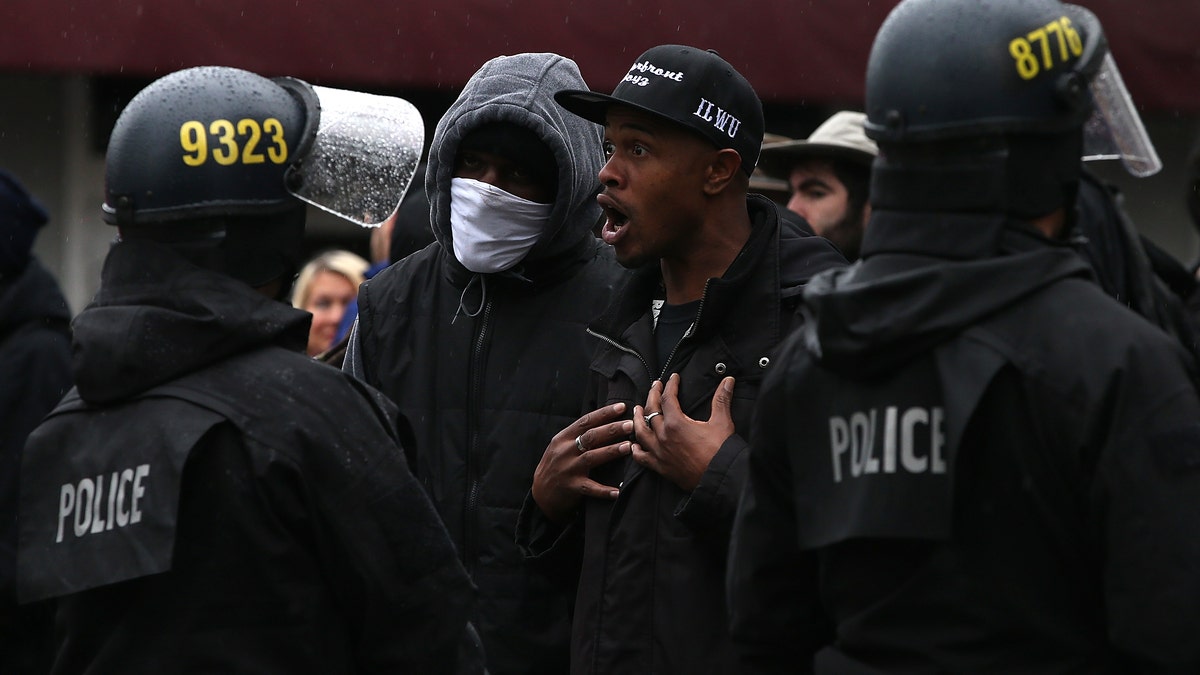
OAKLAND, CA - DECEMBER 15: A protestor yells at a line of Oakland police officers during a demonstration over recent grand jury decisions in police-involved deaths on December 15, 2014 in Oakland, California. Over 200 hundred protestors blocked entrances to the Oakland police department and adjacent streets during a demonstration against recent grand jury decisions in New York and Missouri to not charge white police officers with the deaths of black men. Dozens were arrested. (Photo by Justin Sullivan/Getty Images) (2014 Getty Images)
The protests sweeping across the country in the wake of Ferguson, Mo., and the death of Eric Garner were sparked, in part, by the notion that police can get away with things no other person can.
On Monday, the Supreme Court added fuel to the fire when it ruled, for the first time, that police are allowed to make “mistakes of law” during the course of enforcing the law.
"Now that the Supreme Court has in essence ruled that to err is human only if you’re the police, we are left to wonder how we can go about our daily lives without being suspected of breaking some law, even imaginary ones."
If that doesn’t make much sense, you’ve gotten a taste of how the Supreme Court works. Much of its decision making isn’t based on reality, but on legal formalism—judge-made rules designed to bring order to the interpretation and application of the law.
In practice, however, these rules often create more confusion among law enforcement, lawyers, lower courts, and ordinary citizens. And Heien v. North Carolina, is no exception.
The case centered around Nicholas Brady Heien, who was stopped by the police while riding in a car with a broken brake light. That happens to everyone, except that it is not a traffic offense in North Carolina to drive with a broken brake light. The law there only requires that a car be “equipped with a stop lamp,” not two. Unaware of this distinction, the police stopped the car anyway, and a subsequent search revealed Heien had cocaine in his possession.
- NYC Mayor Bill de Blasio invokes his multiracial family to try to heal divided city
- Latino leaders express dismay over Ferguson violence, sadness over grand jury decision
- Police detain four suspects in case of missing Miss Honduras 2014
- Second night of protests in Berkeley, California, over police-related deaths
- Rallies, vigils in NYC and across U.S. for missing Mexican students ask for end of drug war
“He got what he deserved,” you may think. But not so fast. The point of the Fourth Amendment, which was at issue in this case, is not to catch criminals, but to protect everyone from government overreach. At the very least, you would think, police need to know the law they’re enforcing.
Suppose for a moment you’re in the shoes of Mr. Heien, but you don’t have any drugs in your car. You’d still be stopped by police on the basis of the broken brake light, and would perhaps receive a ticket. A big inconvenience. The violation is minor, so you probably wouldn’t bother going to court or hiring an attorney; you’d simply plead guilty, pay the fine, and call it a day.
But why would you do that? You didn’t break the law. The police shouldn’t have stopped you to begin with.
To the Supreme Court, none of this matters. Chief Justice John G. Roberts, Jr., who authored the 8-to-1 decision, said that it all boils down to whether an officer’s mistaken understanding of the law was “reasonable.”
But what’s reasonable? In law, “reasonableness” means a number of things, but it generally means public officials can get away with conduct you and I can’t, so long as they reasonably believed they were doing the right thing.
“To be reasonable is not to be perfect,” Roberts wrote, “and so the Fourth Amendment allows for some mistakes on the part of government officials, giving them fair leeway for enforcing the law in the community’s protection.”
That sounds laudable on paper, but in practice, the “fair leeway” officials are afforded is nothing but fair. It is very broad—so broad, a national movement is now afoot demanding more accountability for police misconduct. Rulings like Heien, which hold public officials and citizens to different standards, do nothing to ease tensions. They empower police—in the context of everyday interactions with whom they took an oath to serve and protect—to be excused for mistakes others without a badge would be penalized.
Sonia Sotomayor, the lone dissenter in Heien and the only justice with criminal trial experience, acknowledged the double standard and would have ruled that “an officer’s mistake of law, no matter how reasonable, cannot support the individualized suspicion necessary” for a stop.
That was Sotomayor’s legal conclusion to her colleagues and scholars. But her practical conclusion reached further: the decision erodes the “protection of civil liberties in a context where that protection has already been worn down.”
Here she’s writing to the people—the ones most affected by day-to-day police encounters—whether in Ferguson, New York City, or elsewhere: “One wonders how a citizen seeking to be law-abiding and to structure his or her behavior to avoid these invasive, frightening, and humiliating encounters could do so.”
Indeed, there’s no way to know. And now that the Supreme Court has in essence ruled that to err is human only if you’re the police, we are left to wonder how we can go about our daily lives without being suspected of breaking some law, even imaginary ones.
